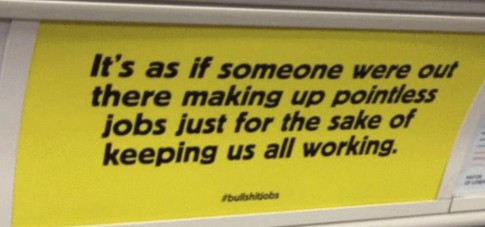– New Poll Results Show – 37% of British Workers Think Their Jobs are Meaningless (Liberty Blitzkrieg, Aug 13, 2015):
Earlier this year, I highlighted an excellent article by David Graeber in the post: A Practical Utopian’s Guide to the Coming Collapse – David Graeber on “The Phenomenon of Bullshit Jobs”. Here’s an excerpt:
Graeber’s argument is similar to one he made in a 2013 article called “On the Phenomenon of Bullshit Jobs”, in which he argued that, in 1930, economist John Maynard Keynes predicted that by the end of the century technology would have advanced sufficiently that in countries such as the UK and the US we’d be on 15-hour weeks. “In technological terms, we are quite capable of this. And yet it didn’t happen. Instead, technology has been marshalled, if anything, to figure out ways to make us all work more. Huge swaths of people, in Europe and North America in particular, spend their entire working lives performing tasks they believe to be unnecessary. The moral and spiritual damage that comes from this situation is profound. It is a scar across our collective soul. Yet virtually no one talks about it.”
But what happened between the Apollo moon landing and now? Graeber’s theory is that in the late 1960s and early 1970s there was mounting fear about a society of hippie proles with too much time on their hands. “The ruling class had a freak out about robots replacing all the workers. There was a general feeling that ‘My God, if it’s bad now with the hippies, imagine what it’ll be like if the entire working class becomes unemployed.’ You never know how conscious it was but decisions were made about research priorities.” Consider, he suggests, medicine and the life sciences since the late 1960s. “Cancer? No, that’s still here.” Instead, the most dramatic breakthroughs have been with drugs such as Ritalin, Zoloft and Prozac – all of which, Graeber writes, are “tailor-made, one might say, so that these new professional demands don’t drive us completely, dysfunctionally, crazy”
Graeber believes that since the 1970s there has been a shift from technologies based on realising alternative futures to investment technologies that favoured labour discipline and social control. Hence the internet. “The control is so ubiquitous that we don’t see it.” We don’t see, either, how the threat of violence underpins society, he claims. “The rarity with which the truncheons appear just helps to make violence harder to see,” he writes.
It seems many workers in the UK agree. We learn the following from a recent YouGov poll:
Earlier this year workers in London were greeted on their morning commute by signs bemoaning the meaninglessness of much of modern employment. One read: “It’s as if someone were out there making up pointless jobs for the sake of keeping us all working.” Another: “Huge swathes of people spend their days performing tasks they secretly believe do not really need to be performed.” No one knows who put the signs up, but the quotes were taken from a 2013 article in STRIKE! magazine that did well at the time.
New YouGov research has sought to verify if the attitude expressed in the article is as prevalent as it says.
37% of working British adults say their job is not making a meaningful contribution to the world. Half of British workers (50%) say their job is meaningful, and 13% are unsure. Men (42%) are more likely to say their jobs are meaningless than women (32%).
Londoners are the most likely regional grouping to say their jobs are unfulfilling (41%), while the Midlands and Wales have the highest levels of job fulfilment (67% fulfilled, 26% not).
This is truly sad. Considering how much time people spend working throughout their lives, what does this say about overall fulfillment? It doesn’t seem promising.
As Mr. Graeber put it himself on Twitter earlier today:
another way to put it: only half the workforce believes their job does anything that actually needs to be done https://t.co/vyjt8Vx9y6
— David Graeber (@davidgraeber) August 13, 2015
Sounds about right.
In Liberty,
Michael Krieger
